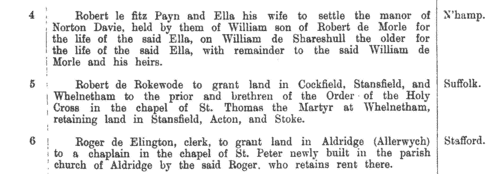Bisshebury Surname Ancestry ResultsOur indexes 1000-1999 include entries for the spelling 'bisshebury'. In the period you have requested, we have the following 3 records (displaying 1 to 3):
Buy all | |
| Get all 3 records to view, to save and print for £12.00 |
These sample scans are from the original record. You will get scans of the full pages or articles where the surname you searched for has been found.
Your web browser may prevent the sample windows from opening; in this case please change your browser settings to allow pop-up windows from this site.
Grantees of offices, commissions and pardons
(1317-1321)
The Patent Rolls are the Chancery enrolments of royal letters patent. Those for the 11th to the 14th years of the reign of king Edward II (8 July 1317 to 7 July 1321) were edited for the Public Record Office by G. F. Handcock, and published in 1903. The main contents are royal commissions and grants; ratifications of ecclesiastical estates; writs of aid to royal servants and purveyors; and pardons. Most extensive are the commissions of oyer and terminer to justices to investigate complaints about specific crimes and wrongs in particular counties.BISSHEBURY. Cost: £2.00.  | Sample scan, click to enlarge

|
Charter Rolls
(1050-1326)
This abstract of the surviving charter rolls for 1300 to 1326, in the reigns of kings Edward I and II, was prepared by C. G. Crump and A. E. Stamp and published in 1908. The charter rolls not only recorded royal grants of lands, liberties and offices, but also enabled landowners to have their existing charters, their deeds of title, registered by the process of inspeximus and confirmation. After the Statute of Mortmain of 1279, this was of particular importance to religious houses, now greatly restricted in their ability to receive new donations of land, and anxious to prove title to their ancient property. Consequently, many charters of great age were copied onto the charter rolls.BISSHEBURY. Cost: £4.00.  | Sample scan, click to enlarge

|
Landowners and tenants in Gloucestershire
(1345-1485)
Inquisitions ad quod damnum were held by the appropriate sheriff or escheator (or other officer in whose bailiwick the matter in question might lie) to investigate cases in which the royal or public interest might be damaged by proposed alienation or settlement of land (especially alienation to religious uses, into mortmain). The key findings from these inquisitions were as to the tenure of the land and the service due from it; its yearly value; the lands remaining to the grantor, and whether they sufficed to discharge all duties and customs due from him; and whether he can still be put upon juries, assizes and recognitions, so that the country be not burdened by his withdrawal from them. Generally speaking, this process had the makings of a system of licensing such alienations, and raising money in proportion to the valuations. Equally, there are many items that deal with subjects such as the closing of public roads, the felling or inclosing of woods, or the proposed grant of liberties or immunities. A calendar of these inquisitions from the 19th year of the reign of king Edward III to the 2nd year of Richard III was prepared by the Public Record Office and published in 1906. We have now indexed this calendar by surname and county. Most of the individuals appearing in the calendar are either pious individuals seeking to make grants to religious bodies for the sake of their souls; or landowners securing the disposition and settling of their real estate. But some other names do appear - tenants, trustees, chaplains and clerks.BISSHEBURY. Cost: £6.00.  | Sample scan, click to enlarge

|
Research your ancestry, family history, genealogy and one-name study by direct access to original records and archives indexed by surname.





